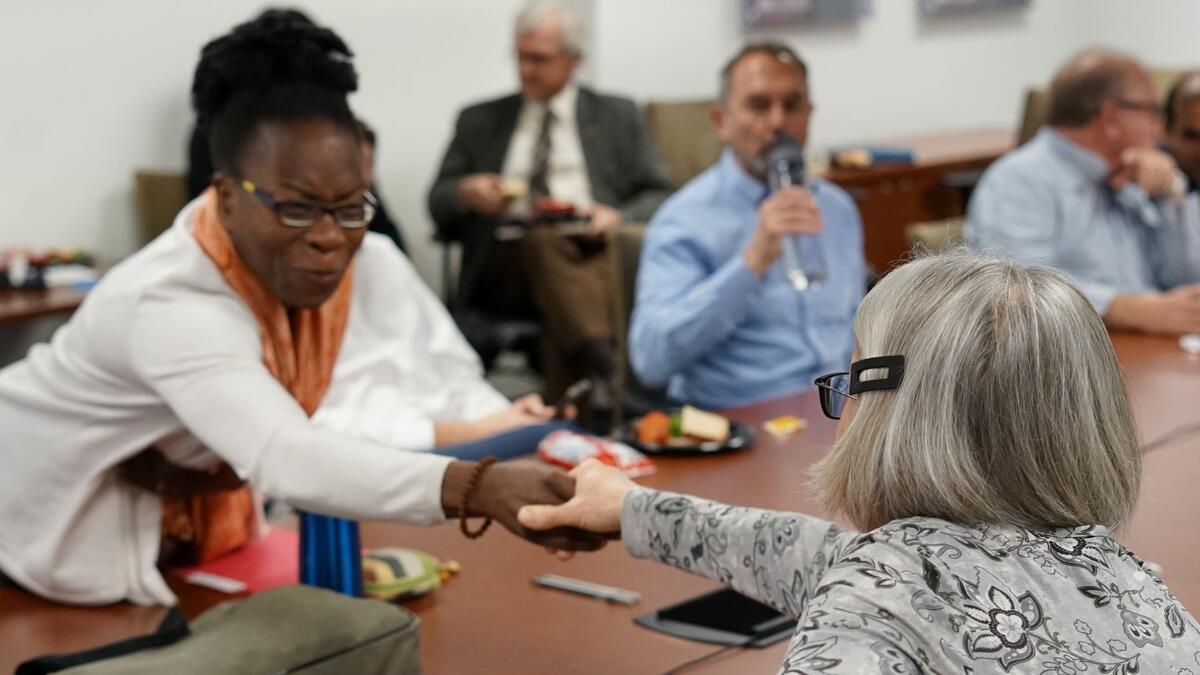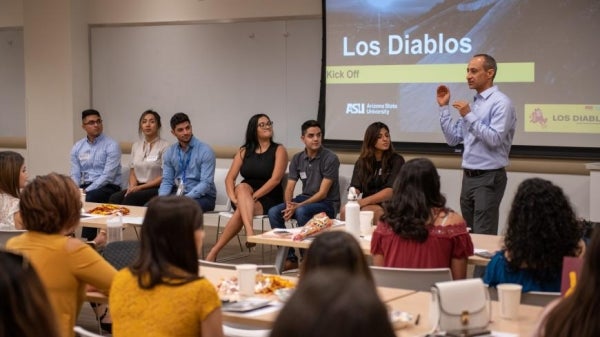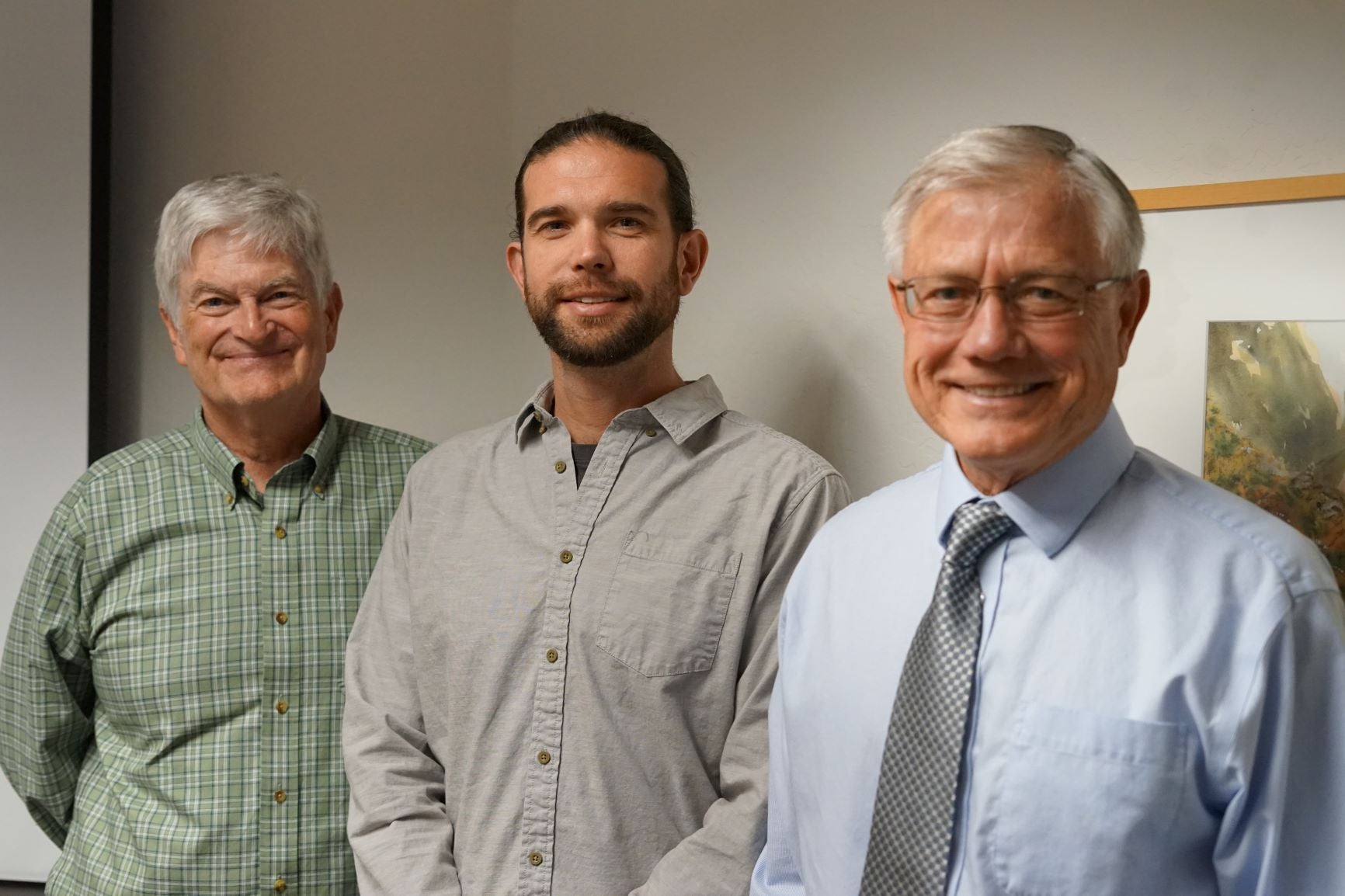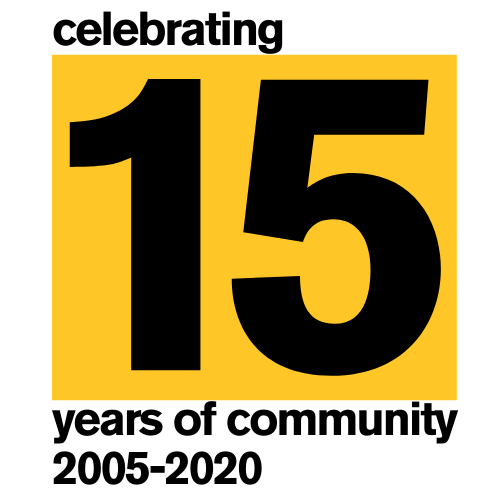School of Community Resources and Development celebrates 15 years

Interim School Director Christine Buzinde (left) greets a visitor to a recent luncheon celebrating the 15th anniversary of the ASU School of Community Resources and Development.
In the 15 years since Arizona State University’s School of Community Resources and Development was created, it has blossomed from its origins as a recreation program into a fully sustainable community that equips students with the tools necessary to create meaningful community partnerships.
In 2004, a new school was approved to combine several disciplines including parks and recreation, tourism, and nonprofit leadership and management.
Originally, the name “School of Community Service and Development” was suggested, said Randy Virden, who was the school’s founding director.
But it didn’t go very far, said Virden, now an emeritus professor who attended a Feb. 6 luncheon celebrating the school’s anniversary. Eventually, the school’s present name won out.
School’s origins trace back more than four decades
The school's roots lie in ASU’s recreation program, which was originally located in the Department of Health, Physical Education, Recreation and Dance. Virden said in 1979 the program was invited to join the then-new College of Public Programs and became the Department of Leisure Studies.
By the 1980s, both the tourism and nonprofit management academic areas were added to the department’s traditional parks and recreation emphasis. In 1994, Virden said, the department was renamed the Department of Recreation Management and Tourism, which is what it was known for until the school was created 10 years later.
Emeritus Professor Tim Tyrrell (left) joins 2007 alumnus Ted Martens, center, and former school Director Randy Virden (right) in celebrating the School of Community Resources and Development's 15th anniversary at a Feb. 5 luncheon.
Original ideas to locate the school at either ASU’s West or Polytechnic campuses were dropped when the School of Community Resources and Development was approved to move from the Tempe campus, Virden said. In 2008, it relocated to the Downtown Phoenix campus as part of the College of Public Programs, now the Watts College of Public Service and Community Solutions.
First tries weren’t confined to only the name of the school. Another emeritus professor who attended the luncheon, Tim Tyrrell, said he originally headed what was called the “Megapolitan Tourism Research Center.” The cumbersome first word was later dropped, said Tyrrell, who helped set up the school’s PhD program.
Virden said over the years the fields taught by the school’s faculty have changed significantly, particularly in the use of technology. The school itself has changed as well, he said, in that it is a fully sustainable community, with core classes even more aligned to the skills students need.
More interdisciplinary approaches
School Interim Director Christine Buzinde said one of the most noticeable changes in the school over the years is its transformation toward a more interdisciplinary approach that equips students with multidimensional tools necessary in creating meaningful community partnerships, which facilitate the co-creation of effective solutions.
"If you want a career through which you can make a difference in society, SCRD is the place to be."
— School Interim Director Christine Buzinde
Students from parks and recreation management, tourism development, nonprofit leadership and management, community sports management and recreation therapy take core courses familiarizing themselves with the fields. Students studying parks and recreation, for example, are discovering better ways to help citizens learn how to use their parks to lead healthier lives, and recreation therapy students are learning how to use recreation to rehabilitate individuals with disabilities.
Community sports management students are learning about the role of sports in, for example, youth development while those whose emphasis is in tourism are finding out how tourism can contribute to the sustainable development of communities. The nonprofit leadership and management students are oriented to the dynamics of working with nonprofits to champion community initiatives.
The school is accepting more socially and environmentally conscious students who not only want a good-paying job upon graduation, but one that effectively helps others.
“If you want a career through which you can make a difference in society, SCRD is the place to be,” Buzinde said.
’07 grad today promotes ‘conservation travel’
The featured speaker at the Feb. 6 luncheon was 2007 school graduate Ted Martens, vice president for marketing and sustainability at Boulder, Colorado-based Natural Habitat Adventures (NHA), where he promotes his company as a leader in what it calls “conservation travel.”
While at ASU earning his master’s degree in tourism development, Martens researched ecotourism development in Central America. Before joining NHA in 2011, he was outreach and development director for Sustainable Tourism International, a nonprofit dedicated to applying sustainability solutions to the tourism industry.
In an interview after his talk, Martens said during his time at ASU he was able to combine his own travel history into research that opened up the field to him.
He said that since he graduated, the idea of sustainable tourism has been growing and merging into the larger travel industry.
“Today there is a lot more pressure as the industry has evolved for purveyors and curators of these types of experiences to have some meaning and teeth behind those experiences,” he said. He said NHA has focused on providing a positive impact on the communities where they lead tours.
Students contemplating careers in tourism should foster the passion for travel they’ve gained from their own experiences, Martens said.
People who deeply love travel dominate the tourism industry, he said. “If you care about the planet, you’ll want to go see it.”
Martens said he and his fellow NHA employees fit that mold, combining their individual passions to create unforgettable experiences for their customers.
“You should have a passion for the planet, the environment, for sustainability,” he said. “It’s an amazing combination.”
Sustainable tourism is still a small part of the overall travel industry, so there is room for it to continue to grow, Martens said. “So, you have to set yourself apart. Get a degree in sustainable tourism, that really helps. Put the time in and work your way up even after you get your degree.”
More University news

ASU Alumni Association to honor 3 outstanding alumni leaders during Homecoming
The Arizona State University Alumni Association will proudly recognize three innovative alumni leaders during the Homecoming…

From service to civilian success
Transitioning from military to civilian life is a unique experience that can be challenging for veterans. Some struggle to find…

ASU as the 'New American University' sets the model for higher education reform
Arizona State University’s charter is only 46 words long, but it’s a bold promise that’s a model for the reinvention of higher…

